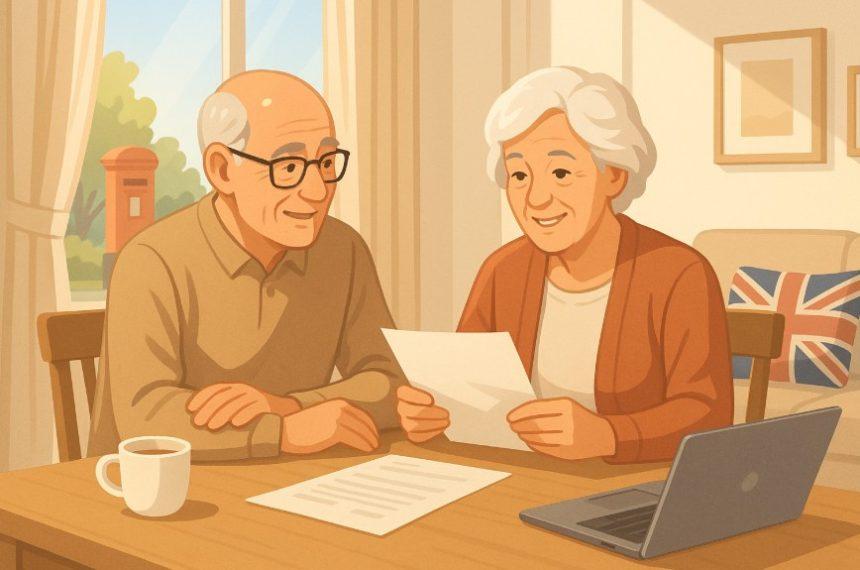Have you ever wondered if you or someone you care for could be entitled to the £110 DWP Attendance Allowance payment in 2025? This benefit from the UK Government is meant to help individuals aged State Pension age or older who are struggling with physical or mental health conditions that make daily tasks difficult.
If you need help with personal care or supervision during the day and night, the Department for Work and Pensions (DWP) offers weekly financial assistance to ease that burden.
Despite being widely available, over one million people in the UK are missing out on this essential benefit. Many are unaware of their eligibility, how much they could receive, or how to apply.
This guide breaks down everything you need to know in simple terms. Whether you’re applying for yourself or someone else, it’s time to understand who qualifies and how to unlock this financial support. Let’s explore how it all works.
What Is the £110 DWP Attendance Allowance Payment?
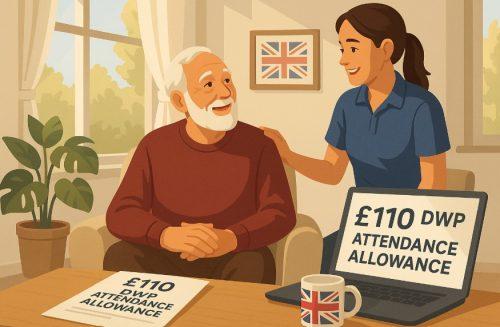
The £110 DWP Attendance Allowance is a non-means-tested, tax-free benefit paid to people who have reached State Pension age and need help with personal care due to a disability or long-term health condition. It is managed by the Department for Work and Pensions and is designed to help people remain independent in their own homes.
Attendance Allowance is provided at two different weekly rates, depending on the level of care you need. This benefit does not cover mobility needs, nor is it affected by your income or savings. You don’t need to have a career to qualify. However, if you do, your carer may be entitled to Carer’s Allowance. The benefit is usually paid every four weeks directly into your bank account.
Who Qualifies for the 110 Attendance Allowance?
To receive the £110 Attendance Allowance in 2025, you must meet specific eligibility criteria based on age, health, and care needs. This benefit is intended for individuals who struggle with daily activities due to long-term physical or mental health conditions.
You may qualify if:
- You are State Pension age or older, currently 66 or above.
- You have had a disability, illness, or mental health condition for at least six months, unless you are terminally ill.
- You require help with personal care such as bathing, eating, dressing, or need supervision for safety.
- You are habitually resident in the UK and not subject to immigration control.
- You are not currently claiming Disability Living Allowance (DLA) or Personal Independence Payment (PIP).
Even if you live alone and don’t receive care from another person, you can still apply based on your needs. Eligibility focuses on your condition and its impact on your daily life. If your care needs change over time, your allowance rate may also be adjusted accordingly.
How Much Can You Get from Attendance Allowance?
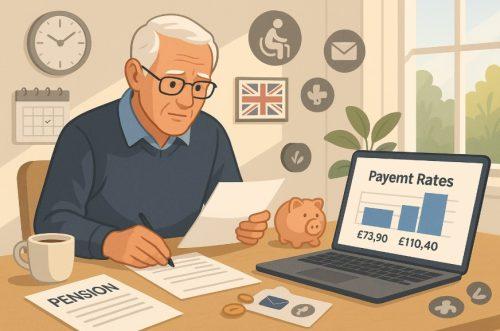
Attendance Allowance rates for 2025 are structured to reflect the level of support you need.
There are two tiers:
- Lower Rate: £73.90 per week – For those who need help during the day or at night.
- Higher Rate: £110.40 per week – For those needing help during both day and night or who are terminally ill.
| Rate | Weekly Amount | Four-Week Total | Annual Total |
| Lower Rate | £73.90 | £295.60 | £3,845.60 |
| Higher Rate | £110.40 | £441.60 | £5,740.80 |
The commonly referenced £110 figure refers to the higher weekly rate for those with more severe care needs. The DWP determines your rate based on the information you provide about your condition and daily difficulties.
Payments are made every four weeks, although your initial payment may include backdated support depending on the date your claim was received. This tax-free benefit can significantly improve your quality of life by helping cover personal care costs.
How Do You Claim the £110 DWP Attendance Allowance?
Applying for Attendance Allowance is straightforward, but the more details you include, the better your chances of success. Here’s how to do it:
- Get the form: Request it by calling the Attendance Allowance helpline or download it from the GOV.UK website.
- Complete the form carefully: Be thorough when describing how your condition affects your daily life, especially tasks like dressing, bathing, and eating.
- Include supporting documents: Attach medical records, GP letters, prescriptions, or a care assessment to strengthen your case.
- Send your application: Post the completed form to the address provided with all necessary documents.
After submission, DWP may contact your GP or health professionals for additional information. You’ll receive a decision typically within a few weeks.
If successful, payments will begin shortly after and could be backdated to the date you requested the form. If you’re terminally ill, your claim is fast-tracked, and you are automatically awarded the higher rate.
When Will the £110 Attendance Allowance Be Paid in 2025?
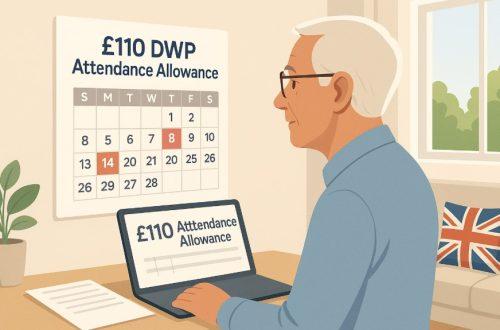
Attendance Allowance is paid every four weeks into your bank account. While there are no fixed national dates like other benefits, payment timing depends on your application date and approval timeline. Here’s what you can expect in 2025:
| Month | Estimated Payment Window |
| January | 1st – 28th |
| February | 1st – 25th |
| March | 1st – 28th |
| April | 1st – 25th |
| May | 1st – 28th |
| June | 1st – 27th |
| July | 1st – 29th |
| August | 1st – 27th |
| September | 1st – 26th |
| October | 1st – 29th |
| November | 1st – 26th |
| December | 1st – 20th |
Bank holidays may cause delays in payment, especially around Easter, Christmas, and public holidays. If that happens, payments are usually made earlier, not later.
You might also receive backdated payments from the date you initially contacted DWP for the form, so it’s worth applying early to avoid delays in financial support.
Is the £110 Attendance Allowance Taxable or Means-Tested?
One of the biggest advantages of the Attendance Allowance is that it is not means-tested and not taxable. This means your:
- Income
- Savings
- Property value
Do not impact your eligibility or payment amount. You can still be working, retired, or receiving other pensions without affecting your claim. This benefit does not reduce your State Pension, nor does it count as income for tax purposes. So you can claim it with confidence that your other benefits and income will not be negatively affected.
Additionally, claiming Attendance Allowance can sometimes increase your entitlement to other benefits, so it has added value beyond the weekly payment.
Can You Get Other Benefits Alongside Attendance Allowance?
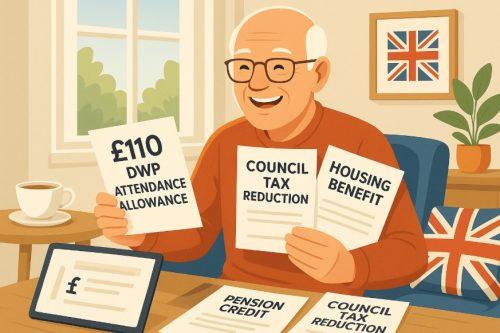
Receiving Attendance Allowance often opens the door to additional financial support.
It may increase or unlock entitlement to other benefits, including:
- Pension Credit: Boosts income for low-income pensioners.
- Housing Benefit: Reduces rent costs for those eligible.
- Council Tax Reduction: May lower your council tax bill.
- Carer’s Allowance: If someone provides care for you for 35+ hours a week.
These benefits are separate from Attendance Allowance and are applied for through their respective departments. Even if you weren’t eligible before, claiming Attendance Allowance could tip you into qualifying. Importantly, it does not affect your State Pension, and there is no impact on your savings or income thresholds for most other benefits.
What If You’re Denied Attendance Allowance?
If your application is denied, don’t panic. You still have several options. Many claims are refused due to incomplete information or lack of supporting evidence.
Here’s what you can do:
- Request a Mandatory Reconsideration: Ask DWP to review your decision within one month of the original notice.
- Submit more evidence: Medical records, care plans, or letters from your GP can support your appeal.
- Appeal to an independent tribunal: If the reconsideration fails, you can take your case to an impartial tribunal panel.
You may also contact Citizens Advice for free assistance with the appeals process. Being specific and honest about your care needs can make a huge difference during a reconsideration.
Conclusion
The £110 DWP Attendance Allowance is a vital benefit designed to help older adults in the UK manage daily care needs. Whether you struggle with a long-term illness, mental health condition, or physical disability, this tax-free support can make independent living more manageable.
It’s not affected by your savings, income, or whether you have a career, and it may unlock further financial help through other benefits. If you think you qualify, don’t delay in applying.
Every week you wait could mean missing out on payments you’re entitled to. With a straightforward application process and potential backdated payments, now is the time to act. Make sure you understand the criteria and give yourself or your loved one the support they deserve.
FAQs
Can you receive Attendance Allowance if you’re still working?
Yes, Attendance Allowance is not affected by employment or income. You can work and still receive it if you meet the care requirements.
How long does it take to process an Attendance Allowance claim?
It usually takes about six weeks to receive a decision, although claims for terminal illness are fast-tracked and processed sooner.
Do you need a carer to claim Attendance Allowance?
No, having a carer is not required. The benefit is based on your personal care needs, not whether someone is actively helping you.
Will Attendance Allowance affect my State Pension?
No, your State Pension will not be reduced. Attendance Allowance is separate and does not impact your pension entitlements.
Can you get Attendance Allowance for mental health conditions?
Yes, if your mental health condition affects your ability to perform daily tasks or requires supervision, you may qualify.
Is Attendance Allowance the same as PIP?
No, Attendance Allowance is for people over State Pension age, while PIP is for people under that age with similar care needs.
What medical conditions qualify for Attendance Allowance?
Conditions like arthritis, dementia, Parkinson’s, chronic pain, and other long-term illnesses or disabilities may qualify depending on care needs.


